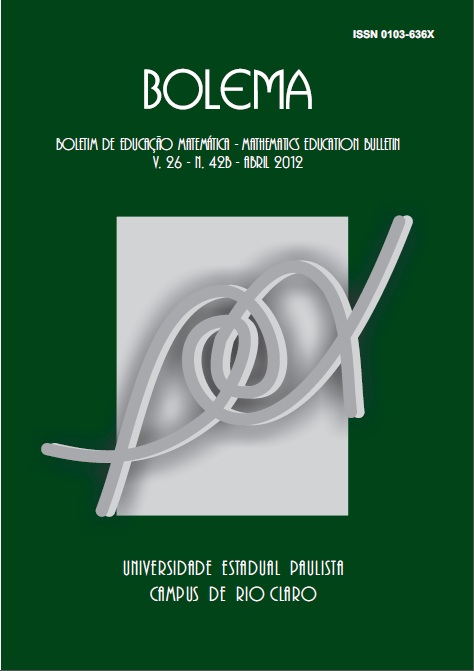<b>Non-thesis Master´s Level Pre-Service Mathematics Teachers’ Conceptions of Proof</b>
Palavras-chave:
Proof. Proving. Conceptions of Proof. Pre-Service Mathematics Teacher.Resumo
Abstract This case study research was carried out with eight pre-service teachers enrolled in a non-thesis Masters degree program at the university where the author works after having earned undergraduate degrees in mathematics from different universities in Turkey. The study is part of a large-scale study. The main part of the study aimed to identify the conceptions of participants about proof and proving in a period of ten weeks. The present study contains the preliminary findings regarding the participants’ opinions about the meaning of proof and proving and the purposes of proof. Three groups of data were used in this article. The first group involves the essay writing of pre-serviceteachers; the second group involves whole group discussions; and the last group contains individual semi-structured interviews. The results demonstrate that the preservice teachers often prefer using formal discourse to define proof but have certain difficulties in making sense of these definitions. The general opinion of the participants about the purposes of proof concentrates on verification and explanation. Another problem examined in the study was concerned with whether the pre-service teachers’ opinions about the meaning and purposes of proof can change. The results showed that their opinions may change regarding both. However, the changes involved expansion of their previous opinions by adding new dimensions, without moving in another direction. Keywords: Proof. Proving. Conceptions of Proof. Pre-Service Mathematics Teacher. As Concepções de Professores Pós-graduandos sobre Provas Formais Resumo Este estudo de caso, realizado com professores pós-graduandos em cursos universitários nos quais atua o autor, na Turquia, é parte de uma pesquisa de grande escala. O objetivo principal do estudo é identificar as concepções desses pós-graduandos sobre a prova formal e a atividade de implementá-la. Este artigo explicita os resultados preliminares da pesquisa e centra-se na opinião dos participantes sobre o significado de prova, da ação de provar e das intenções dessa estratégia formal e de seu uso. Três grupos de dados foram utilizados neste artigo: o primeiro envolve ensaios escritos produzidos pelos pósgraduandos; o segundo envolve as discussões em grupo e o último grupo refere-se a entrevistas individuais semi-estruturadas. Os resultados demonstram que os professores muitas vezes preferem o discurso formal para definir a prova, mas têm dificuldades quando solicitados a atribuir significado a essas definições. A opinião geral dos participantes sobre os objetivos de uma prova formal foca-se na verificação e na explicação. Outro objetivo do estudo foi atentar para a possibilidade de alteração das concepções desses professores pós-graduandos sobre os temas em foco. Nesse sentido, os resultados mostram que as suas opiniões, tanto em relação ao significado quanto aos objetivos de uma prova, se alteram. Tais mudanças envolvem novas ideias acerca das concepções anteriormente defendidas e incorporam novas dimensões, mas não são suficientes para alterar significativamente as crenças prévias. Palavras-chave: Provas Formais. Concepções sobre Provas. Formação Continuada.
Downloads
Publicado
Edição
Seção
Licença

>>>>> BOLEMA: Mathematics Education Bulletin = BOLEMA: Boletim de Educação Matemática, Rio Claro, SP, Brasil - eISSN 1980-4415 - está licenciado sob Licença Creative Commons


